Fact checked – 8 min read
Xmas is a time to be merry, a time to to visit family and friends and indulge in some delicious morsels. Why not, given all that’s happened this year, I think we all deserve it don’t we? We often struggle for some healthy food ideas for our guests, foods that can pack the proverbial nutrition punch! So iv made it easy for you to make some informed choices about which healthy Xmas food combos to enjoy with your friends and family. Here are my nine healthy suggestions to ensure you are an Xmas hit and not an Xmas flop, accompanied with some top prep tips and recipe ideas to serve some memorable dishes on the day. Please don’t blame me if your guests don’t like them, but honestly, I doubt it, ha! Images have been obtained from royalty-free sources unless otherwise stated.
PURCHASE AN XMAS VOUCHERS
A great stocking filler idea
Disclaimer – this post is meant for general information only and not as personal dietary recommendations. Although generally safe and healthy, some of these foods could cause adverse reactions in those allergic to them or not ideal for those with certain autoimmune or other health conditions. Please ensure to contact me for more personalised dietary advice.
BRUSSELS SPROUT

Brussels sprouts: Although a bit like marmite, as in, you either love them or hate them, brussels sprouts are a cruciferous vegetable, and a good source of vitamin C and folate (vitamin B9). They contain a powerful antioxidant called Alpha lipoic acid (1), which can help with weight loss by improving blood sugar control as well being able to recycle vitamins C, E and glutathione, the body’s master antioxidant. They are also a rich source of a sulfur-containing compound called sulforaphane which are what gives the cruciferous veggies their cancer-fighting abilities, as well as their distinct smell and harsh taste. Fibre is also present, and can help contribute to your minimum 30g of fibre a day as recommended by UK dietary guidelines. Fibre is required to keep the gut healthy, although too much fibre could be counter-productive in some gastrointestinal conditions (which is why it’s important if you are experiencing any chronic gastrointestinal condition to come and see me!). Sprouts have a bad reputation for causing flatulence, however, there are plenty of delicious ways to prepare them to reduce their bitter taste.
Top prep tips: Briefly chop them in a food processor and roast the sprouts with some of my recommended Xmas combos; pine nuts & raw honey, chestnuts & nutmeg; pecan & dried cranberries; pistachios & pomegranate seeds; hazelnuts & orange zest; garlic, chilli & lemon zest and juice. Adding some grass-fed butter and a pinch of Himalayan salt can help balance the harsh notes of the spouts. You can also add one or two in smoothies as part of a morning-after strategy!
CARROTS
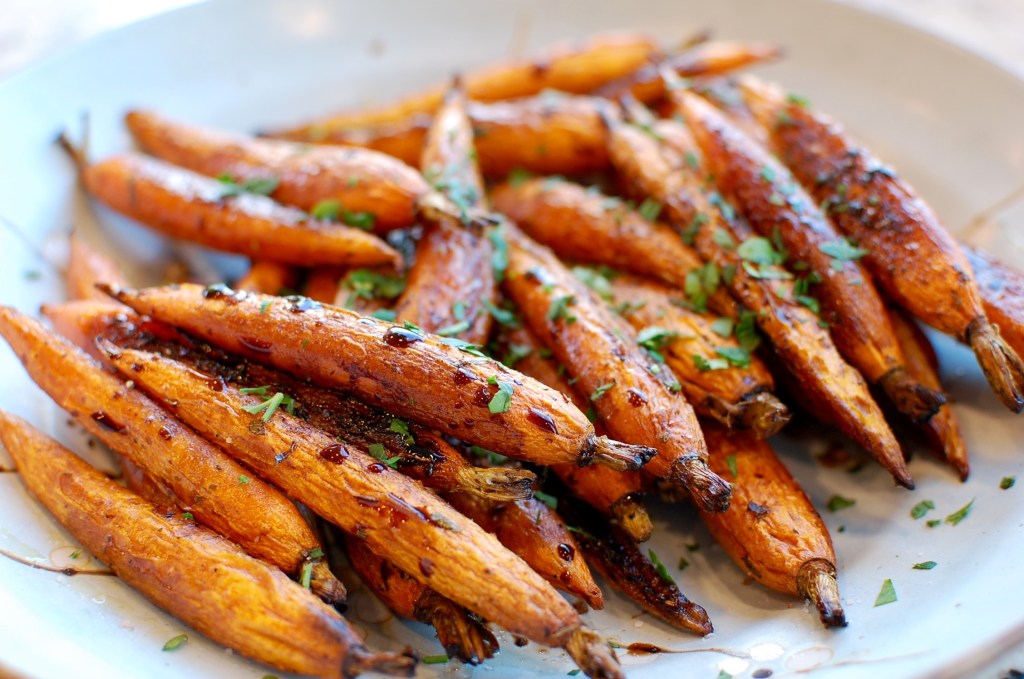
Carrots: Carrots are one of the best sources of beta carotene (pic below ) (3), a fat-soluble carotenoid which the body converts to various forms of vitamin A required for normal vision, healthy skin and immune function, helping to maintain gut integrity and support the function of immune ‘sentinels’ known as immunoglobulins (4). They can be prepared in a variety of different ways, roasted with olive oil and herbs such as rosemary and thyme, or grated in salads, mashed with cumin, steamed or even raw in smoothies or with hummus for a vegan xmas party dip.
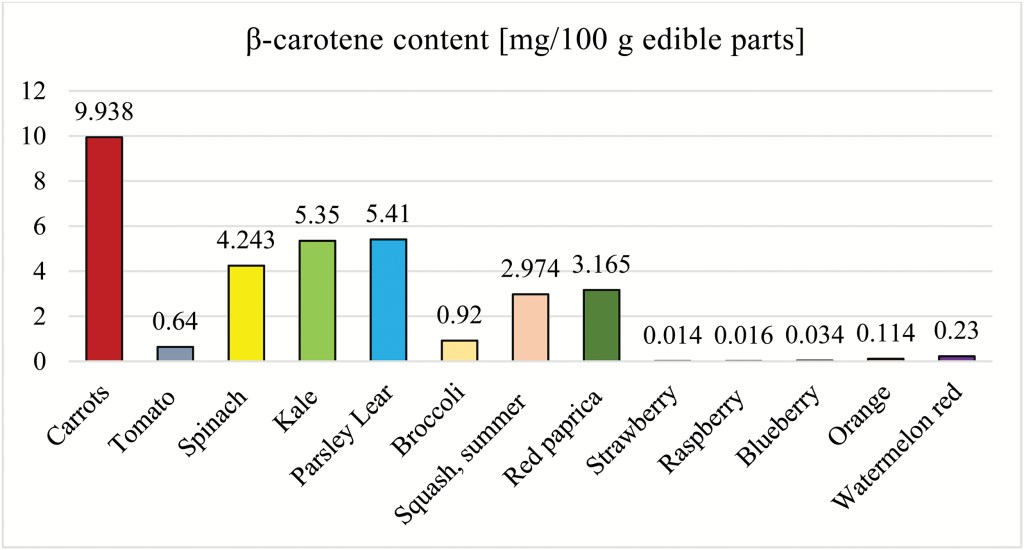
Top prep tips: Consider parboiling the carrots first to tenderise them. Then, oven-cook the carrots in a pre-heated oven for about 20mins at approx 180 degrees on the (middle shelf), drizzled with some balsamic vinegar and extra virgin olive oil, grass-fed butter (or coconut oil) and some mixed chopped herbs and spices. Drizzle in some raw honey near the end. TIP: Add the mixed herbs about 10 minutes before they are ready to ensure the herbs don’t burn.
CITRUS FRUITS
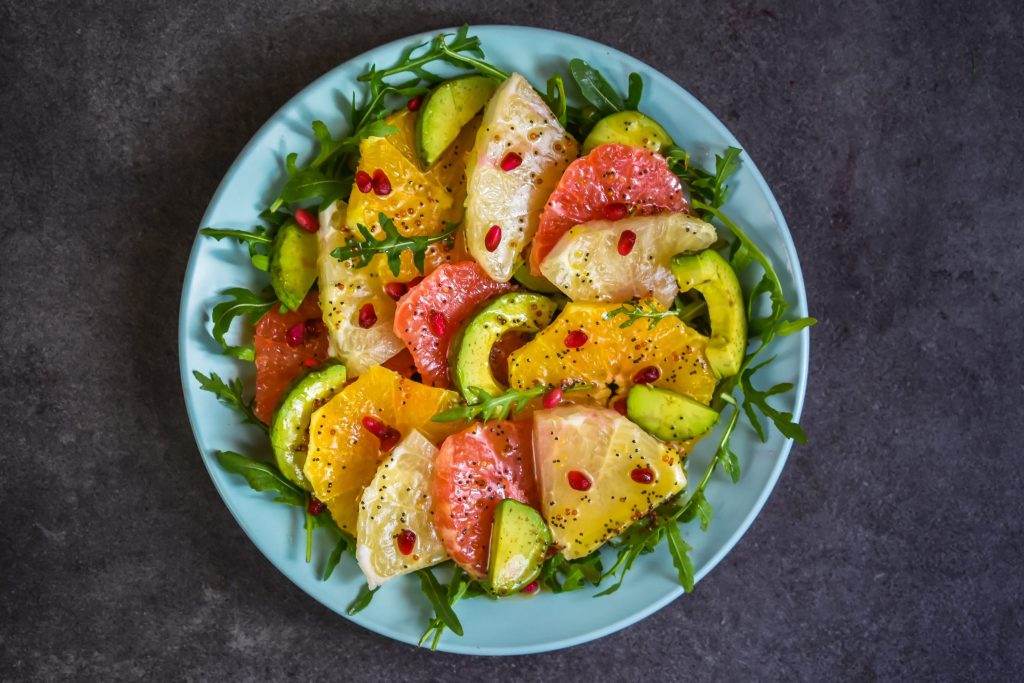
Citrus fruits: Oranges, clementines, tangerines and lemons are easy to consume (ok apart from the lemons!) at home and on the go, rich sources of vitamin C and antioxidants, important for supporting your immune system to keep you fighting fit during the current cold & flu season (I wont mention that other dreaded C word!) A tasty contribution to your 5-a-day and the perfect addition to your children’s Xmas stockings (okey, not the lemons again!). A lot of the antioxidants are hidden just beneath the outer peel called the ‘pith’, so make sure you don’t peel off the skin with all the glorious white bits removed, use a knife and be generous leaving some of these antioxidant-rich regions, your body will appreciate it.
Top prep tips: Combine the chopped or sliced oranges, clementine or tangerines with grapefruit, and lemon slices (yes lemons too!). Adding some raw honey or Manuka can help cut through the bitter taste of the grapefruit and lemon. Add some pomegranate seeds, pine nuts, walnuts, for some ‘texture, or other greens such as rocket rich in antioxidants. Consider other veggies such as avocado, red peppers and even roasted potatoes for added colour, vitamin C, fibre and healthy fats.
CRANBERRIES
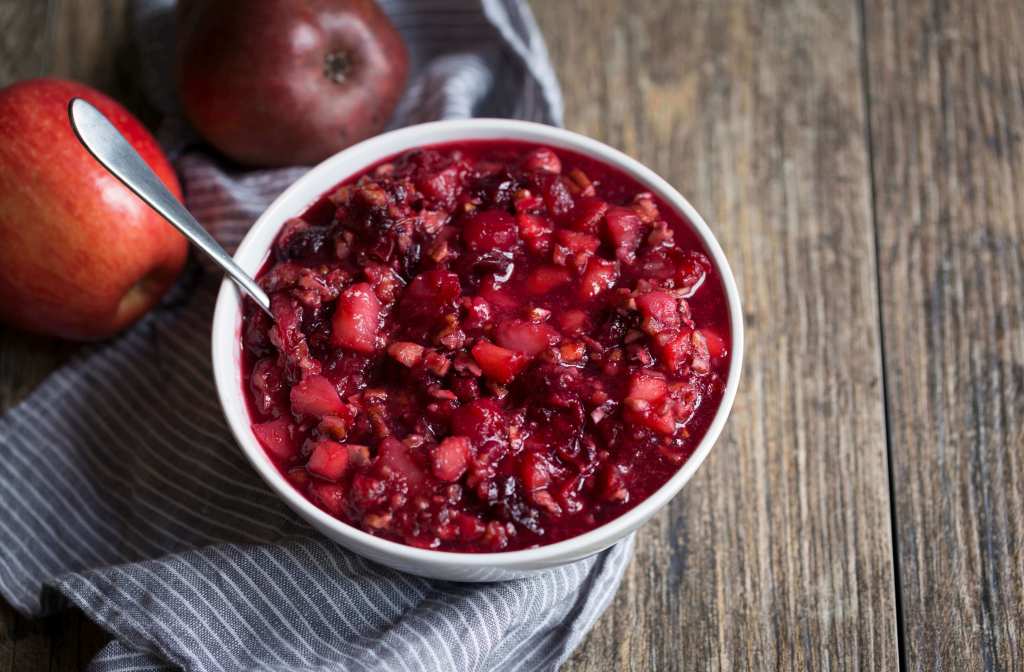
Cranberries: Fresh or frozen cranberries are packed with vitamin C, but because they are sharp, cranberry processed foods and drinks can have a lot of added sugar in them. Try making your own cranberry sauce, or a no-added-sugar ‘mocktail’ cranberry drink mixed with some fresh orange juice and cinnamon for an xmassy twist. Cranberries can help combat urinary tract infections as a result of their high antioxidant levels, known as anthocyanidins and proanthocyanins (6).
Top prep tips: You can lightly heat them in a pan for about 15 minutes, mashing them gently, adding 1/2 teaspoon of Chinese five spice, a touch of cinnamon, a clove and a single (split) cardamon pod to infuse ‘xmas essence’, some raw honey and lemon juice to taste, and a small pinch of nutmeg. Optionally, you can also add a small amount of grated apples, without their skin as these can be high in pesticides.
DATES & FIGS
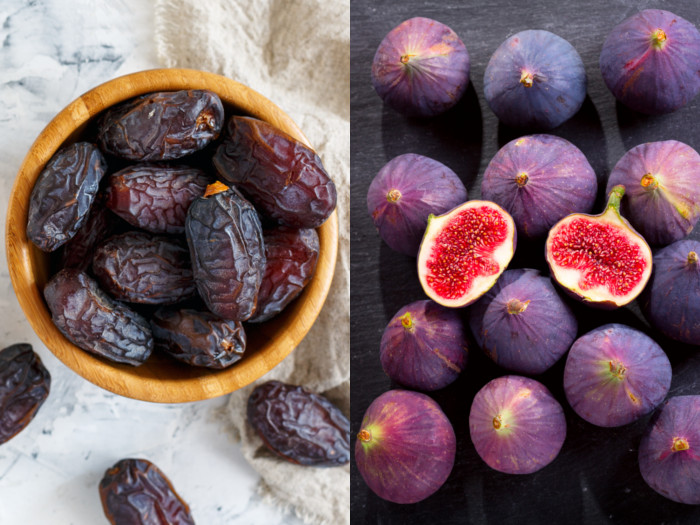
Dates and figs: These are great, fruity festive favourites. Dried figs and dates can be added chopped to a warming winter cereal breakfast, smoothies or sprinkled over salads or even in a meaty roast. Figs can be added to a variety of sweet and savoury dishes. For example, try fresh or dried figs in salads or with cheese. Dried figs provide potassium, calcium, iron and magnesium and can also count towards your 5-a-day (three dates or two dried figs count as one portion). However, dried fruits can have higher sugar levels so source them fresh and consume in moderation if possible. Additionally, dried fruits also have considerably higher levels of histamine, so those prone to hayfever, food allergies or those watching over their waistlines should take note of all this and consider if they are right for you, or even better, come and see me for a more personalised, safe dietary plan which can help you achieve your health goals.
Top prep tips: Simply combine with some nuts and any other vegetables in a salad and add any homemade dressing. Also pairs well with roasted meats.
NUTS

Nuts: Whether you are vegetarian or just cutting back on your meat-intake, nuts can make for a great snack. Nuts can added to any dish raw or roasted. be a tasty addition to the Christmas dinner table, providing a range of nutrients including potassium, iron, zinc, B vitamins, folate and vitamin E. They are also a great source of arginine, an amino acid pre-cursor of Nitric oxide, a vasodilatory molecule which can help reduce hypertension and cardiovascular disease. Nuts are also a good source of mono and polyunsaturated fats, a form of dietary fat that can be beneficial for heart health. Some nuts may not be suitable for some autoimmune diseases or other conditions.
Top prep tips: Combine with a fresh feta cheese & spinach dip which can be combined in a food processor with some extra virgin olive oil, parsley, lemon juice and a touch raw honey
POTATOS & PARSNIPS
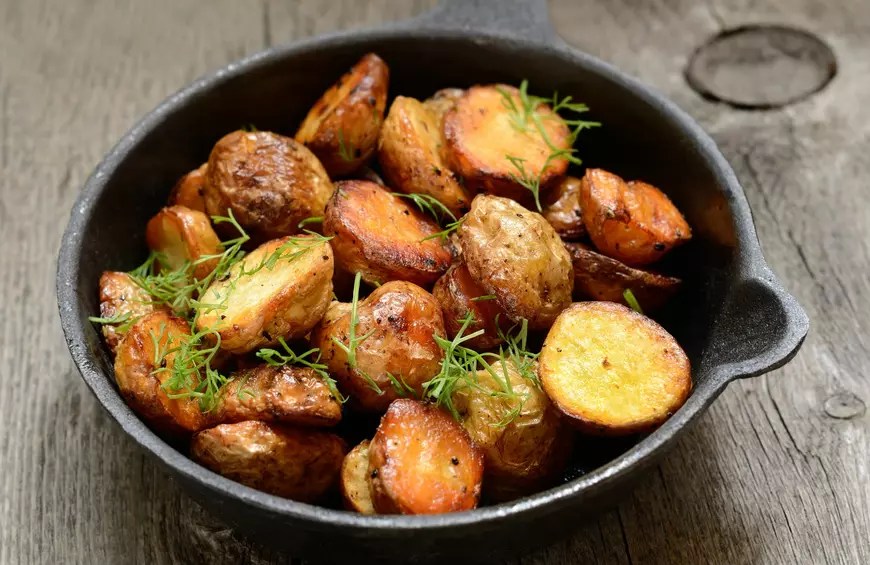
Roast potatoes and parsnips: Christmas isn’t Christmas without some roasties! In the UK, potatoes make a good contribution to potassium and vitamin C intakes. Opt for a mixture of roasted potatoes, parsnips and other vegetables for greater variety. Although leaving the skins on adds taste and fibre, it can be a problem for persons with autoimmune and inflammatory conditions as a result of being part of the nightshade family, containing reasonable levels of alkaloids. Alkaloids can also have other beneficial effects for other diseases, thats why personalisation of dietary and lifestyle interventions is essential, and a good reason why you need to come and see me. Discard any green-looking ones as these tend to be higher in these alkaloids. Parsnips are good sources of minerals such as phosphorus, potassium, magnesium, manganese, zinc, iron, folate , as well as vitamins B, C, E and K. Parsnips also contain two antioxidants called falcarinol and falcarindiol, which have been shown to have anti-inflammatory properties and could reduce risks of breast cancer as evidenced in in-vitro cell studies (8), the findings of which cannot necessarily be extrapolated in humans in-vivo.
Top prep tips: Parboil the parsnips and potatoes for about 5-10 mins until slightly soft. Red onion rings and other root veggies (parboil too) are a great companion. Drizzle with some extra virgin olive oil, some goose fat (or coconut oil), mixed herbs and spices in a oven at 180 degrees for approx 30 mins (middle shelf), or slightly more till required consistency is achieved. Adding the herbs 10 minutes before ready to make sure you don’t burn them.
SALMON
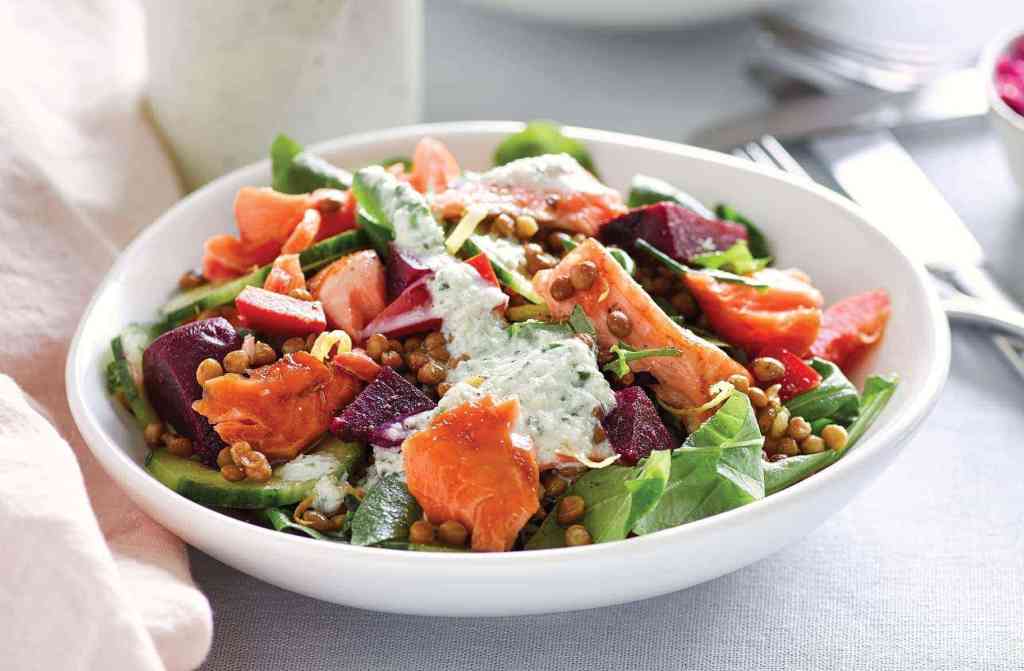
Salmon: Salmon are rich in long chain omega-3 fatty acids which are an important form of healthy fat for heart and brain health, and can help to reduce the risks of depression. It is recommended to include a portion of oily fish in the diet two or three times a week, but the average person has less than half a portion. Also be extremely mindful not to purchase farmed salmon often, as these can contain a higher levels of saturated fat and less omega 3, as well as other less healthy compounds ingested from their farm feeds. Try and source sustainably-caught wild salmon if possible. Xmas is the perfect time to boost your intake, canned salmon still counts as an oily fish, so you could try mixing it with lower-fat cream cheese, lemon and pepper as a dip in a food processor, or mashed with left-over potatoes and herbs to make impromptu fishcakes. If your preference is smoked salmon, be aware that this can be high in salt and so should be consumed in moderation. If you’re vegetarian or vegan, walnuts and flax seeds are good sources of the plant omega-3s and can be easily added to porridge or baked into many of your festive dishes.
Top prep tips: You can steam or slowly oven cook the salmon ‘en-papillote’ (cooked inside some foil & baking sheet with some water) and serve with lentils, chickpeas, nuts, seeds and various leafy greens. Add some raw honey or fresh lemon juice for an added ‘zing’. Vegans can replace the salmon with tofu or avocado, adding chia seeds and quinoa for some extra protein.
TURKEY

Turkey: The traditional turkey is a great source of tryptophan (an animo acid protein building block) which can help fight depression and required for the formation of vitamin B3 (niacin). Turkey is also a good source of vitamins B6 & B12 which can help to support a healthy immune function. Turkey doesn’t have to be only for Xmas day. Leftovers can make a great, tasty and hearty chowder (example image above) for that cold winter boxing day! Vegans can replace the turkey with some tofu, marinated overnight in some roasted sesame seed oil for an added deep rustic flavour.
Top prep tips: Try stewing the chowder with the left over turkey bits, extra virgin olive oil, various veggies and herbs and add a tablespoon of ras-el-hanout Moroccan spice, which gives a superb savoury / spicy twist and some Himalayan salt to taste.
Finally, I am sure you have all gained some extra virtual ‘healthy’ weight after reading some of the recommended recipes. So once all the Xmas festivities are over and done with, why not consider my New Year detox programme personalised to your own health condition or health goals. A safe and evidence-based way of detoxing after the Xmas and New Year’s indulgences, and why not, perhaps the perfect new year resolution. All that’s left for me to say is, have a very merry Xmas and a happy new year.
1. Pereira C, Li D, Sinclair AJ. The alpha-linolenic Acid Content of Green Vegetables Commonly Available in Australia. Int J Vitam Nutr Res [Internet]. 2001 Jul 1 [cited 2021 Dec 21];71(4):223–8. Available from: https://econtent.hogrefe.com/doi/10.1024/0300-9831.71.4.223
2. The 350 Degree oven. Balsamic Roasted Carrots — The 350 Degree Oven [Internet]. 2015 [cited 2021 Dec 21]. Available from: http://www.the350degreeoven.com/2015/06/vegetables-side-dishes/balsamic-roasted-carrots/
3. Bogacz-Radomska L, Harasym J. β-Carotene—properties and production methods. Food Qual Saf [Internet]. 2018 Jun 20 [cited 2021 Dec 21];2(2):69–74. Available from: https://doi.org/10.1093/fqsafe/fyy004
4. Chew BP, Park JS. Carotenoid Action on the Immune Response. J Nutr [Internet]. 2004 Jan 1 [cited 2021 Dec 21];134(1):257S-261S. Available from: https://doi.org/10.1093/jn/134.1.257S
5.Blake-Richards A. Citrus Salad [Internet]. WILDFIT. 2021 [cited 2021 Dec 21]. Available from: https://getwildfit.com/citrus-salad/
6. Maria M, Constantinos G. Cranberry Consumption Against Urinary Tract Infections: Clinical Stateof- the-Art and Future Perspectives. Curr Pharm Biotechnol [Internet]. 2018 Oct 31 [cited 2021 Dec 21];19(13):1049–63. Available from: https://www.eurekaselect.com/168109/article
7. The Kitchenista Diaries. The Kitchenista Diaries: Curry Turkey Soup [Internet]. The Kitchenista Diaries. 2018 [cited 2021 Dec 21]. Available from: http://www.kitchenistadiaries.com/2018/01/curry-turkey-soup.html
8. Tan KW, Killeen DP, Li Y, Paxton JW, Birch NP, Scheepens A. Dietary polyacetylenes of the falcarinol type are inhibitors of breast cancer resistance protein (BCRP/ABCG2). Eur J Pharmacol [Internet]. 2014 Jan 15 [cited 2021 Dec 21];723:346–52. Available from: https://www.sciencedirect.com/science/article/pii/S0014299913008522




You must be logged in to post a comment.